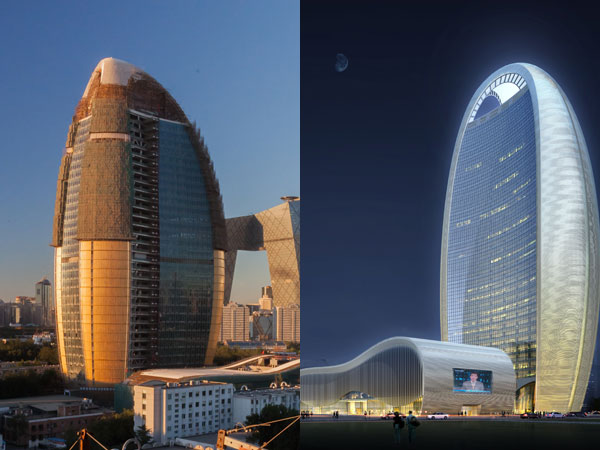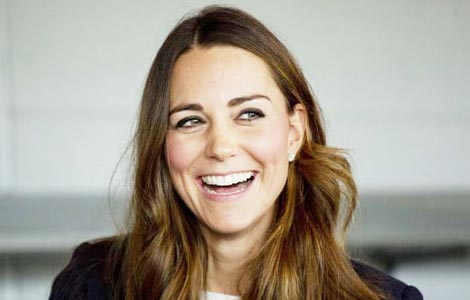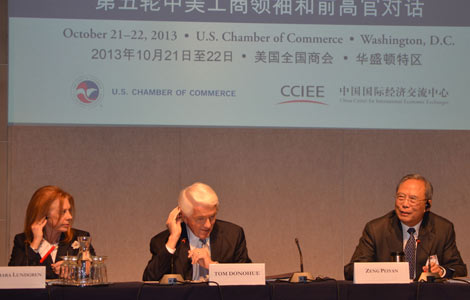Architect looks to the big picture
Updated: 2013-10-22 00:48
By Sun Yuanqing (China Daily)
|
||||||||
The man behind the new People's Daily headquarters unveils the inspiration behind his controversial design, and promises the finished product will silence critics. Sun Yuanqing reports.
 |
|
From left: The new People’s Daily headquarters building is under construction in Beijing. Sketch of the building designed by Chinese architect Zhou Qi. Photos provided to China Daily |
Beijing is full of futuristic buildings, but the new People's Daily headquarters stood out in pictures that caught it from a particular angle, giving it a phallic appearance. Having drawn attention for its shape in April, the building again became an online sensation for the newly plated gold on its surface, an iPhone 5S-like color that makes the building look even more garish.
Despite speculation on social media, Zhou Qi, the architect, remains upbeat, saying he believes the building will be a modest addition to Beijing's CBD that will add character to the area.
"This is a coincidence between the angle and this particular stage of construction, I never thought the scaffolds on top of the building would last for so long," says Zhou, who is also a professor at Southeast University in Jiangsu province. "Now combined with the sexual connotation and the newly launched iPhone 5S, it's totally understandable why people are so excited about it."
The gold "plate" is in fact the inner coat of the building, which contains insulating materials. That will soon be covered by a layer of silvery liuli, an ancient Chinese glassware with porcelain-like texture. The cap on top of the shaft, which has been the center of public attention, is in fact scaffolding to help to install the double coats. The scaffolding will be removed in a month, Zhou says.
Zhou chose gold as the color for the inner coat in a show of respect to the history of Beijing because gold has been extensively used in ancient architecture in Beijing, like the Forbidden City. However, the architect says the color won't stand out as much as it does now when coated with the semi-transparent liuli.
Inspired by double-curved creations that are commonly seen in nature, Zhou decided to make a difference to the concrete jungle in the CBD area in Beijing, which includes OMA's CCTV headquarters and China World Trade Center Tower III.
"Think about eggs and shells, they are all bi-curved. All the buildings in the CBD area are like square boxes, so I wanted to make something with an organic form, something closer to nature," Zhou says.
The model of the building springs from an oval that developed in various dimensions to a triangular form with concave walls and rounded corners.
To achieve good aesthetics from all angles, Zhou and his team used two different materials on the facade. On the concave walls where the radiant is gentle, they used glass, which gives better ventilation and lighting for the office.
On the edges where the radiant runs more sharply, they weaved more than 220,000 liuli rods together to round the corner. The liuli net will reflect the blue sky and white clouds, and have a dynamic visual effect that resembles the blue and white porcelain.
The smooth surface of the liuli net also allows the dust to fall onto the inside coat without sticking on the outer coat, which will be very difficult to clean.
Director of the Institute of Architectural History and Theory at Southeast University, Zhou believes in Chinese philosophical ideas such as moderation and peaceful coexistence.
"The building has to connect with the surrounding with tenderness. It has to coexist peacefully with the numerous skyscrapers that will soon be built in this area," Zhou says.
Without a definite orientation in the triangular form, it's very easy for the building to blend into the area and be an organic part of it, Zhou says.
The triangular form also adds to its ability to resist earthquakes. Because of the rounded shape, 72 percent of the area in the building is usable, compared to the average 55 percent of skyscrapers, Zhou says.
From a bird's-eye view, the building resembles the Chinese character ren, which means "people" in Chinese. It is also the first character of the Chinese name of People's Daily, an interesting coincidence Zhou did not think about until he finished his design.
With a moderate height of 180 meters and area of 150,000 square meters, Zhou expects the building to be humble but not featureless. "It is not imposing, but always recognizable."
The building will be finished by March and will be handed over by May, he says.

 Post-baby Duchess
Post-baby Duchess
 Victoria Beckham S/S 2014 presented during NYFW
Victoria Beckham S/S 2014 presented during NYFW
 'Despicable' minions upset Depp's 'Lone Ranger' at box office
'Despicable' minions upset Depp's 'Lone Ranger' at box office
 'Taken 2' grabs movie box office crown
'Taken 2' grabs movie box office crown
 Rihanna's 'Diamonds' tops UK pop chart
Rihanna's 'Diamonds' tops UK pop chart
 Fans get look at vintage Rolling Stones
Fans get look at vintage Rolling Stones
 Celebrities attend Power of Women event
Celebrities attend Power of Women event
 Ang Lee breaks 'every rule' to make unlikely new Life of Pi film
Ang Lee breaks 'every rule' to make unlikely new Life of Pi film
Most Viewed
Editor's Picks

|

|

|

|

|

|
Today's Top News
Walmart China strategy: 110 new stores
China's GDP growth to 7.6%: Standard Chartered
Scholar looks at the kung fu-hip hop connection
Mobile giants talk future in Frisco
Starbucks' pricing furor: tempest in a coffee pot
100,000 Strong student exchange picks first partners
Report: China could profit rebuilding US
Holiday may boost sales of new iPads
US Weekly

|

|







